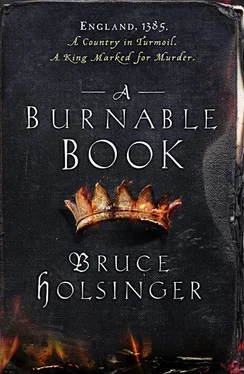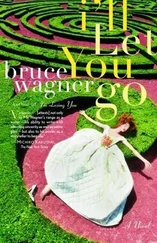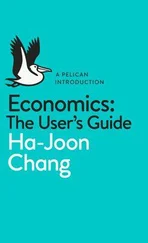Bruce Holsinger - A Burnable Book
Здесь есть возможность читать онлайн «Bruce Holsinger - A Burnable Book» — ознакомительный отрывок электронной книги совершенно бесплатно, а после прочтения отрывка купить полную версию. В некоторых случаях можно слушать аудио, скачать через торрент в формате fb2 и присутствует краткое содержание. Год выпуска: 2013, Издательство: HarperCollins Publishers, Жанр: Исторический детектив, на английском языке. Описание произведения, (предисловие) а так же отзывы посетителей доступны на портале библиотеки ЛибКат.
- Название:A Burnable Book
- Автор:
- Издательство:HarperCollins Publishers
- Жанр:
- Год:2013
- ISBN:нет данных
- Рейтинг книги:4 / 5. Голосов: 1
-
Избранное:Добавить в избранное
- Отзывы:
-
Ваша оценка:
- 80
- 1
- 2
- 3
- 4
- 5
A Burnable Book: краткое содержание, описание и аннотация
Предлагаем к чтению аннотацию, описание, краткое содержание или предисловие (зависит от того, что написал сам автор книги «A Burnable Book»). Если вы не нашли необходимую информацию о книге — напишите в комментариях, мы постараемся отыскать её.
A Burnable Book — читать онлайн ознакомительный отрывок
Ниже представлен текст книги, разбитый по страницам. Система сохранения места последней прочитанной страницы, позволяет с удобством читать онлайн бесплатно книгу «A Burnable Book», без необходимости каждый раз заново искать на чём Вы остановились. Поставьте закладку, и сможете в любой момент перейти на страницу, на которой закончили чтение.
Интервал:
Закладка:
I smiled at him. ‘You’re remarkably careless with your poetry, Chaucer. And always have been.’
He spread his hands, then leaned forward and placed his hands on my knees. ‘You know, John, despite everything, Simon could have betrayed me so easily once he was back in England with my first little book. Why, he could have taken it to Robert de Vere and proved that I wrote the prophecies even while trading on everything else he knew. No one would have noticed that the last prophecy wasn’t there. My draft was just a draft, after all, scratched in my hand. For all anyone else knew I was in league with Lancaster against the king.’
It was a good point, though I still had many doubts. I found myself sifting every word and gesture, going back over every hurried meal and whisper of cloth, looking for the missed seed of Simon’s mendacity.
Chaucer read my thoughts. ‘Simon is confused, John. Brilliant and confused. He has been for years, despite that cock’s face he wears. But confusion isn’t a sin. What matters most is love. And Simon, for all his faults, loves you deeply.’
I let Chaucer’s unmerited confidence hang in the priory air.
‘There’s one part I still don’t understand,’ he said. I tensed. ‘At the end of her account Seguina left me an enigma, a puzzle of the sort we often invented for one another.’ He pulled the letter out of his breast pocket and read it aloud.
‘ Though faun escape the falcon’s claws
and crochet cut its snare,
When father, son, and ghost we sing,
of city’s blade beware.’
He looked at me as he put the letter away. ‘Have you heard this riddle, John, or read it yourself?’
‘No,’ I lied, recalling where I had seen those very words.
‘A crochet, a city’s blade. A bit threatening, wouldn’t you say? Do you know what it means?’
‘No,’ I said, this time speaking the truth. Hawks always strike twice . Weldon’s final words sounded again in my mind, the latest inkling of something missed. I said nothing to Chaucer. He had done enough, and I had no further patience for his manipulations. I felt almost gratified by his ignorance. For there had been something weak about his whole story, a subtle sense that his account was incomplete. That it failed to comprehend the full complexity of the aims motivating those he thought he knew best: Hawkwood and Weldon, Seguina and Simon. Especially Simon.
He was looking at me, waiting for some wisdom. I shrugged, covering my agitation. ‘Likely just a lover’s riddle. The butcher’s blades did no harm, after all, and the king is alive. That’s the important thing, I should think.’
There seemed nothing more to say. By the time Chaucer stretched and yawned I felt utterly drained, despite my inner turmoil at hearing Seguina’s riddle. There was a twinge in my back. ‘We are becoming old men, Geoffrey.’
He barked a laugh over the orchard as we rose. ‘Old age is relative, John. It’s writing that keeps us young. Or so I hope this summer will prove.’
Not for the first time I found myself wishing I saw my making as Chaucer experienced his. The man aged backwards, it seemed, accumulating youth with each fresh scratch of ink. For me every line of poetry is another grey hair, a defeat as much as a victory.
‘So what will you write?’ I said to his back, willing him to leave. I had a suspicion to confirm. He preceded me through the kitchen, the darkened lower gallery, the hall. We lingered outside my door, soft moonlight playing on the priory lane. ‘This pilgrimage conceit, the miller and prioress and so on?’
His hand went to his chest again, and there was a whisper of parchment on his thumb. ‘That comes later, after more thought. For now I have in mind the story of Cressida, told in that book of Boccaccio I gave to you. An old tragedy of war, and impossible love.’ His dark eyes caught the flicker of the lanterns up by the gate. ‘And a remarkable woman who learns to survive in the cruellest of worlds.’ With that we parted, and Chaucer moved through the Southwark darkness, his lover’s story still pressed to his heart.
FIFTY-FIVE
St Mary Overey
Ember Days. Penance and prayer, self-denial in all things, the mind focused on our faults and our tenuous hopes of salvation, so the priests instruct us. Chaucer swears that fasting clears the head like nothing else. Perfect for poets, he says, though his own abstinence is notoriously light. While Sarah was a pious observer of this Embers ritual, I tend to ignore it, as I do so many of the Church’s more ascetic dogmas. I felt that week that I would have starved myself for a glimmer of discernment.
Over seven days had passed since Dunstan’s Day. The maudlyns had snuck the corpse out of the Pricking Bishop that same night and abandoned it to the animals of Winchester’s Wild. The king, the duke, and the earl had reached a tentative reconciliation, and in the aftermath of the palace affair it seemed that things had moved on. The king was resolved on a military expedition to the Scottish border, Gaunt was rumoured to be plotting his return to Castile with the help of Lisbon, and the Earl of Oxford had left London for Hall Place, the de Vere family manor at Earls Colne. A papal delegation from Rome was to arrive before Trinity Sunday, and the court had bigger things to think about than an expired prophecy.
The Friday after Pentecost found me in my study, wondering once more what I had missed. Weldon’s dying words — Hawks always strike twice — carried a threat that would not leave my thoughts.
On the desk were the two copies of De Mortibus Regum Anglorum now in my possession. I knew every folio of Sir John Clanvowe’s manuscript, written out in his neat, restrained hand, as I had studied it with great care in those weeks leading up to St Dunstan’s Day. The copy in Simon’s hand, the manuscript that had travelled from Italy and that I had taken from Robert de Vere, was different. The texts themselves were nearly identical, a few scribal errors here and there all that distinguished Clanvowe’s text from the version he had copied from the more ornate manuscript. While Clanvowe’s book was plain and undecorated, the margins of the Italian copy were decorated with the same four emblems found on Swynford’s cards. Thistleflowers, hawks, swords, and plums, arrayed in an ascending pattern: one of each embellishing the first prophecy, two of each the second, and so on.
Yet there was something more. Seguina’s couplet, composed in the common metre of the lays of Robin Hood or Sir Thopas, and scrawled beneath the last line of the final prophecy. I had dismissed the enigma’s importance when Chaucer read it to me from her letter, had even lied to him about seeing it previously. Though I had read those scribbled lines after taking the manuscript from Oxford at Winchester Palace, once the dreadful events of St Dunstan’s Day were past I had given them little thought. Yet to learn that the enigma had emerged from the mind of the woman at the middle of all this changed everything. That very night I had rushed inside after Chaucer’s departure, opened the manuscript, and puzzled over the riddle’s meaning, as I had done every day since. The lines were written not in Simon’s neat hand, but in a thin and spidery script, scratched on the parchment with a charcoal nub and already fading.
Though faun escape the falcon’s claws and crochet cut its snare,
When father, son, and ghost we sing, of city’s blade beware.
The lines seemed meant to recast the imagery from the thirteenth prophecy while adding something darker to the mix. The ‘faun’, of course, was King Richard, and the ‘crochet’ had to be Sir Stephen Weldon, whose scar resembled nothing so much as a fishing hook. The falcon was surely Sir John Hawkwood, and the meaning of ‘father, son, and ghost’ seemed clear enough: the Holy Trinity. What continued to defeat me in this extra fragment of verse was the ominous evocation of the ‘city’s blade’, which could refer to practically anyone in a city as large as London.
Читать дальшеИнтервал:
Закладка:
Похожие книги на «A Burnable Book»
Представляем Вашему вниманию похожие книги на «A Burnable Book» списком для выбора. Мы отобрали схожую по названию и смыслу литературу в надежде предоставить читателям больше вариантов отыскать новые, интересные, ещё непрочитанные произведения.
Обсуждение, отзывы о книге «A Burnable Book» и просто собственные мнения читателей. Оставьте ваши комментарии, напишите, что Вы думаете о произведении, его смысле или главных героях. Укажите что конкретно понравилось, а что нет, и почему Вы так считаете.












